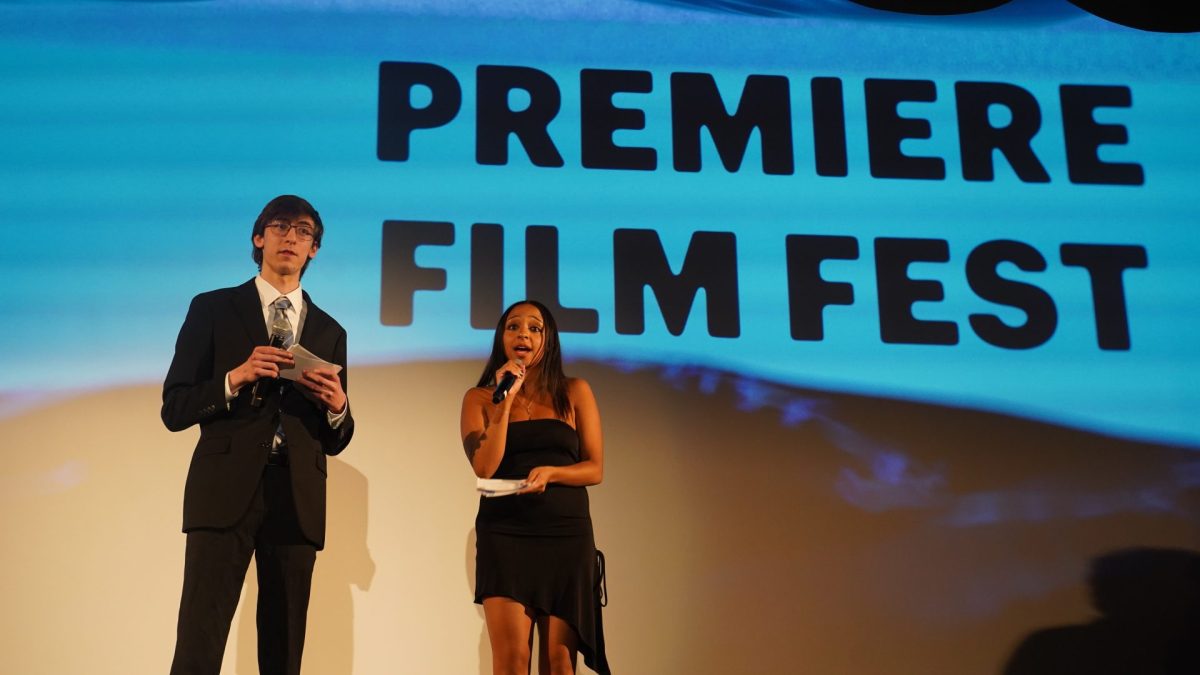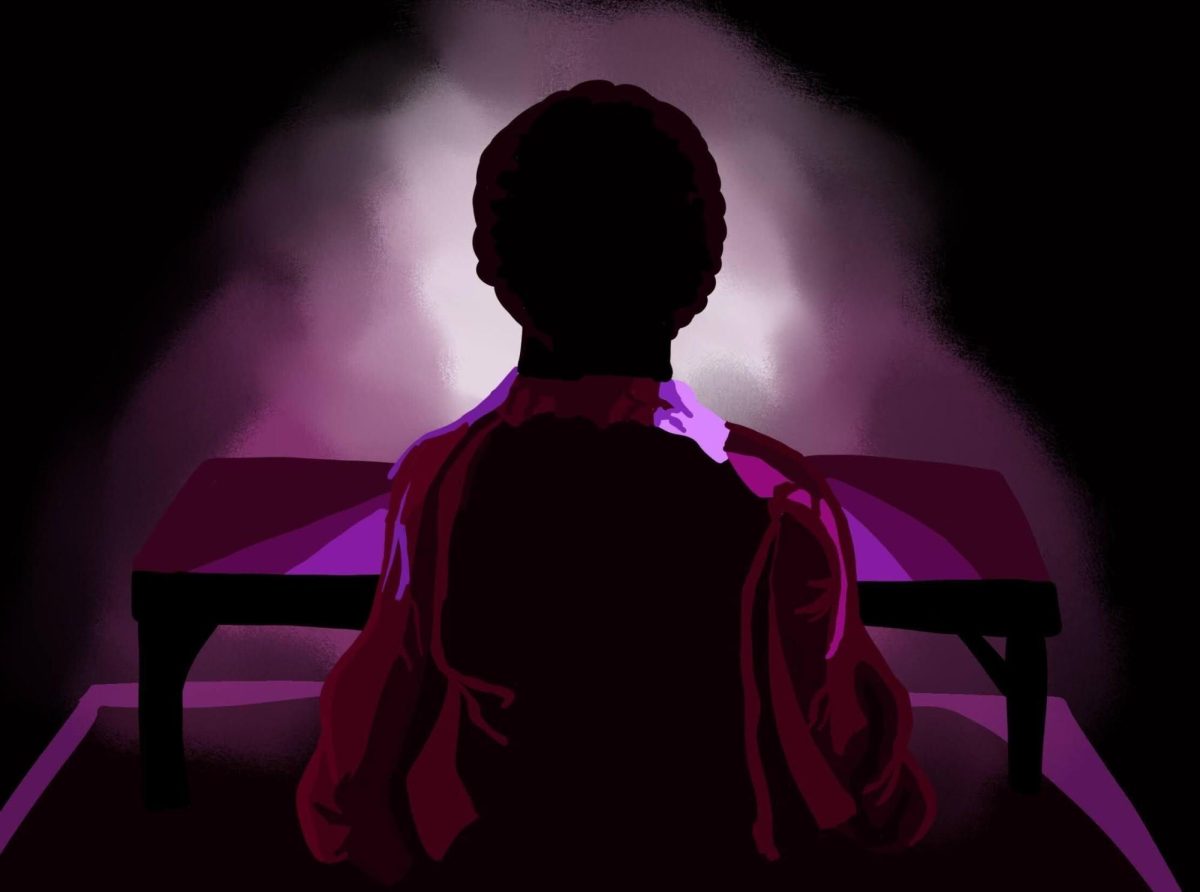A packed house at the Music Box Theater on April 26 waited in anticipation as a moderator tried to introduce the evening’s special guest: Vera Drew, the director/editor/star of “The People’s Joker.” One of the two microphones was malfunctioning. The moderator futzed with the defective mic for a few moments before Vera made a grand entrance from behind the curtain and grabbed the working microphone. She marched on stage clad in a neon green tutu and a pink translucent poker visor.
“I usually do these things unmoderated, so I’m used to being on stage alone,” Drew said. “My lawyers don’t advise it, but I’m an attention whore, so what are you gonna do?”
The crowd, consisting of groups of queer people adorned in clown makeup, cheered.
Trans filmmaker and DePaul student Joi Segreto saw “The People’s Joker” for the first time last October at the Chicago International Film Festival. “I spent the rest of the day on and off in tears,” Segreto said. “Seeing the film at that time in my life was one of the most powerful experiences I’ve had in a theater.”
Segreto is hardly alone in her adoration of the film. Richard Brody, film critic for The New Yorker, calls it “the best superhero film I’ve ever seen — because, unlike studio-produced films in the genre, it responds to the filmmaker’s deep personal concerns.”
The film is currently playing in a roadshow across the United States two years after its first and nearly final screening at Toronto International Film Festival.
Before hosting sold-out screenings across the nation, Drew started out as an editing major at DePaul in 2007.
“I was not a good student at DePaul,” Drew said. “I was clearly a stoner who was making stuff that was a little edgier than what the rest of the student body was making.”
Yet, her intuition as an artist was noticed by a select few professors in the experimental film department. They helped her get accepted into the very first Los Angeles quarter program organized by DePaul, despite her poor grades. “I don’t know if I would’ve ended up in LA at all if it weren’t for DePaul.” Drew said.
After graduating in 2011, she hit the ground running. Via a cold call to their offices, Drew took on an internship at Absolutely Productions, the production studio behind shows like “Tim and Eric,” “The Eric Andre Show” and “Comedy Bang! Bang!” Drew later worked as an editor, eventually winning an Emmy in 2019 for her work on Sacha Baron Cohen’s “Who Is America?”
In 2020, a year after she began her transition, Drew said the seed of “The People’s Joker” was planted.
During her Q&A at the Music Box, she said the project began as a re-edit of Todd Phillips’ “Joker” for her friend Bri LeRose. LeRose ended up with a co-writer credit on the final film.
“I thought it was never going to leave my friend group,” Drew announced. “Now it’s become something much bigger and I’m in indescribable amounts of debt. But it’s out and it’s here!”
Connor O’Keefe, a trans filmmaker and adjunct professor at DePaul, made his own independent documentary short “Imagine A Body” for the same reason.
“It started in a place of exhaustion, a place of loneliness, and definitely a desire to reconnect with the trans community,” O’Keefe said. “I didn’t think it was going to sell, because it’s pretty experimental.”
O’Keefe sold “Imagine A Body” to The New Yorker in June 2022. Along with Drew’s roadshow, Jane Schoenbrun’s new film, “I Saw The TV Glow,” being released by A24 this month and Lily Wachowski being slated to direct her first feature in a decade, it’s clear there’s a burgeoning indie scene full of trans filmmakers.
While the indie scene booms, the big studios falter. The Gay & Lesbian Alliance Against Defamation (GLAAD)’s annual “Where We Are On TV” report said trans representation in basic cable and streaming shows is at its lowest in 7 years.
Even then, GLAAD is just counting the number of trans characters in larger media — not necessarily the quality of that representation.
“I think we’re in an interesting era in the US, at least right now,” O’Keefe said.“Queerness is marketable in a way that it hasn’t been before, which comes with pros and cons. There’s a very narrow set of narratives that we’re allowed to explore which rely on us being able to explain our queerness in a coherent way, when often queerness isn’t coherent.”
Drew said she feels the pressure to conform not only as a trans person, as seen in the film, but also as an artist working in the film industry.
“I got pretty boxed in as an editor,” Drew said.“People will always see you as the thing you did most. What’s happening with ‘The People’s Joker’ doesn’t really happen anymore, but it’s happening to me. I think it’s because I made something very personal outside the studio system that was a big hit.”
O’Keefe is of the same mind about the indie scene.
“I think it’s independent creators who are really breaking that seal of what queer people can look like, because it’s not easily visible all the time,” O’Keefe said. “More is more right now in terms of wider representation, but what really excites me is when a writer or a team uses queerness to show me something about the world.”
With the combined creative effort of over one hundred queer artists from around the globe, “The People’s Joker” combines Drew’s own experience coming out as a trans woman, a defiance of strict copyright laws held by major movie studios, and a celebration of non-conformity at large.
“I hope I was able to bring something to this project and amplify rising artists’ voices, instead of just moving back into this dying studio system overrun by sex pests and assholes,” Drew said. “I gotta be working on my own or helping my friends. I can’t be in the editing bay telling other people’s stories anymore.”
Related Stories








